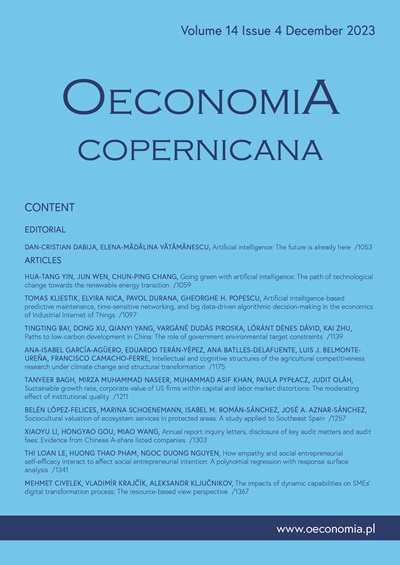Is earnings management impacted by audit fees and auditor tenure? An analysis of the Big Four audit firms in the US market
IF 10.8
1区 经济学
Q1 ECONOMICS
引用次数: 0
Abstract
Research background: Audits are intended to ensure the reliability of financial statements, as this is fundamental for different stakeholders. However, both auditor tenure and audit fees could affect the earnings management of companies. In 2014, the European Union established a mandatory audit firm rotation policy. In the United States, although there is still no mandatory regulation in this regard, there has been a large public debate over the advisability of this policy. Another unresolved controversy is whether audit fees determine audit quality. Purpose of the article: The aim of this research is to study the effect of auditor tenure and audit fees on earnings management, i.e., to determine whether a longer-term relationship between the auditor and the audited company, as well as higher audit fees, reduce the audited company's earnings management, thereby making the financial statements more reliable for stakeholders and increasing the quality of the audit report. In addition, the Big Four auditing companies in the United States were analyzed in order to determine the influence of corporate culture. Methods: A sample of companies listed in the S&P 500 stock market index was employed for the analysis, covering the years 2012 to 2021, resulting in a dataset comprising 3,010 observations. To examine the research hypotheses while mitigating the potential bias from omitted variables, a linear regression analysis was conducted using panel data with fixed effects regression. To enhance the robustness of the results, winsorized variables were also employed. Findings & value added: Overall, the results confirm that the quality of financial statements improves as auditor tenure increases, and so implementing a mandatory auditor rotation may not be in a company’s best interests. The results also support the market segmentation theory, as higher audit fees are aligned with higher quality financial reporting. Furthermore, by analyzing the Big Four audit companies in the US, it is shown that the influence of audit fees and auditor tenure on earnings management also depends on the internal aspects of the particular audit firm, especially its ethical culture. In sum, US policymakers should neither set limits on audit fees nor enforce a mandatory audit firm rotation similar to that of the EU.盈余管理是否受到审计费用和审计师任期的影响?对美国市场四大审计公司的分析
研究背景:审计的目的是确保财务报表的可靠性,因为这对不同的利益相关者来说是至关重要的。然而,审计师的任期和审计费用都会影响公司的盈余管理。2014年,欧盟制定了强制性审计事务所轮岗政策。在美国,虽然在这方面还没有强制性的规定,但公众对这一政策的可取性已经有了很大的争论。另一个悬而未决的争议是审计费用是否决定审计质量。本文目的:本研究的目的是研究审计师任期和审计费用对盈余管理的影响,即确定审计师与被审计公司之间更长期的关系以及更高的审计费用是否会减少被审计公司的盈余管理,从而使财务报表对利益相关者更可靠,提高审计报告的质量。此外,对美国四大审计公司进行了分析,以确定企业文化的影响。方法:采用标准普尔500指数成份股公司样本进行分析,时间跨度为2012年至2021年,数据集包含3010个观察值。为了检验研究假设,同时减少遗漏变量的潜在偏差,使用固定效应回归的面板数据进行线性回归分析。为了增强结果的稳健性,还采用了winsorized变量。的发现,附加值:总体而言,结果证实,财务报表的质量随着审计师任期的增加而提高,因此实施强制性的审计师轮岗可能不符合公司的最佳利益。研究结果也支持市场细分理论,因为较高的审计费用与较高质量的财务报告相一致。此外,通过对美国四大审计公司的分析表明,审计费用和审计师任期对盈余管理的影响还取决于特定审计公司的内部方面,特别是其道德文化。总而言之,美国政策制定者既不应限制审计费用,也不应强制执行类似于欧盟的审计事务所轮岗制度。
本文章由计算机程序翻译,如有差异,请以英文原文为准。
求助全文
约1分钟内获得全文
求助全文
来源期刊

Oeconomia Copernicana
ECONOMICS-
CiteScore
13.70
自引率
5.90%
发文量
26
审稿时长
24 weeks
期刊介绍:
The Oeconomia Copernicana is an academic quarterly journal aimed at academicians, economic policymakers, and students studying finance, accounting, management, and economics. It publishes academic articles on contemporary issues in economics, finance, banking, accounting, and management from various research perspectives. The journal's mission is to publish advanced theoretical and empirical research that contributes to the development of these disciplines and has practical relevance. The journal encourages the use of various research methods, including falsification of conventional understanding, theory building through inductive or qualitative research, first empirical testing of theories, meta-analysis with theoretical implications, constructive replication, and a combination of qualitative, quantitative, field, laboratory, and meta-analytic approaches. While the journal prioritizes comprehensive manuscripts that include methodological-based theoretical and empirical research with implications for policymaking, it also welcomes submissions focused solely on theory or methodology.
 求助内容:
求助内容: 应助结果提醒方式:
应助结果提醒方式:


